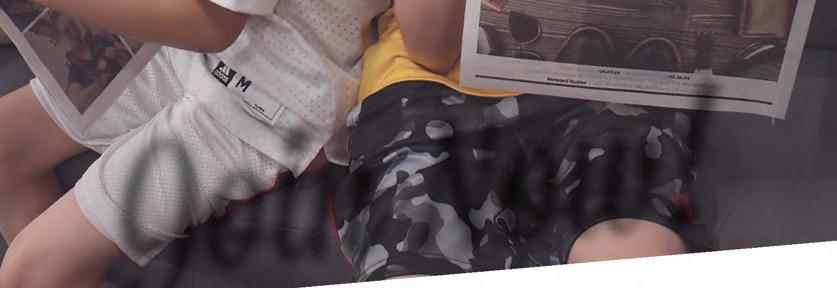








VAN DE KAMP-WRIGHT
Jewish Press EditorThe Kipnis-Wilson/Friedland award is given every two years by our parent organization-the Jewish Federations of North America, to a Lion of Judah who exemplifies the highest standards in philanthropy and volunteerism. The Jewish Federation of Omaha is proud to announce that JFO Board Chair Nancy Schlessinger is this year’s recipient of the Kipnis-Wilson/Friedland Award. Nancy joins an illustrious list of Omaha Jewish community members who have been given this award, including Maxine Kirshenbaum, Zoë Riekes, Anne Shackman, Dorothy Riekes (obm), Nancy Noddle, Jan Schneiderman, Patty Nogg, Stacey Rockman, and Sharon Kirshenbaum.
that Nancy cares so much about our Jewish community means the world. She is the embodiment of a dedicated, tireless volunteer and is always looking for ways to make us all better. She is beyond deserving of this honor.”
The Lion of Judah is a symbol of strength of today’s Jewish women, a symbol of caring about the organized Jewish world and it comes with a yearly financial commitment of at least $5,000 to the Annual Campaign. Being a Lion of Judah also makes a strong personal statement about values and commitment to the future of the Jewish people.
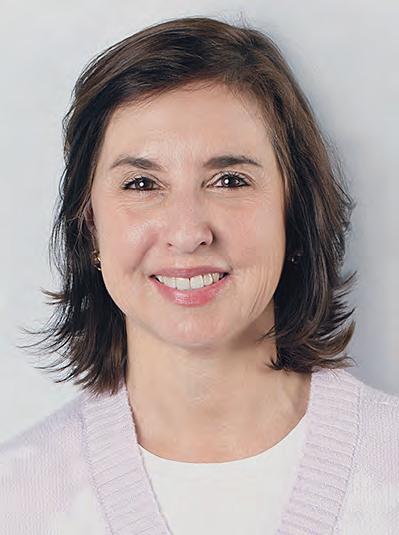
Nancy Schlessinger
“Our community is incredibly lucky to have Nancy Schlessinger as our JFO Board Chair,” JFO CEO Bob Goldberg said. “To know
“When I wear the Lion of Judah pin,” Nancy said, “it makes me feel good to know that I am helping to preserve the Jewish community and inspire family members, friends, and others in the community to consider doing the same thing. While we help, we have to also show others the benefits and examples of tzedakah.”
See Nancy Schlessinger page 2
DR. JEANNETTE GABRIEL
Director, Schwalb Center for Israel & Jewish Studies, University of Nebraska Omaha
John Spencer, featured speaker for the Schwalb Center’s 2024 Ruth and Phil Sokolof Lecture, provided new and important information in his presentation, The Israel-Hamas War and the Contest of Wills: Public Opinion vs. International Law. Spencer, Director of the Modern War Institute at West Point Military Academy, is widely considered one of the leading experts on modern urban warfare and has previously studied the Russo-
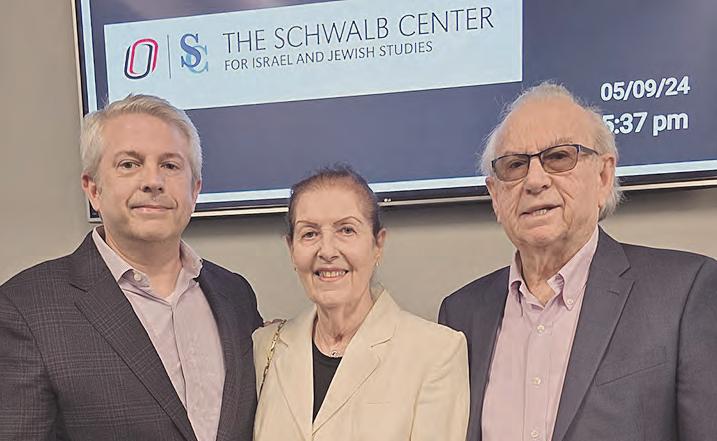
Ukrainian War and the Iraq War.
During his hour-long lecture, Spencer analyzed the military tactics and agendas of both Israel and Hamas within the context of modernday rules of warfare. He also warned that Iran’s recent attack on Israel with 300 drones and missiles represented a dangerous expansion of their ongoing use of proxy warfare. Spencer’s
Jewish Press Editor
After 32 dedicated years, Shelley Cash will retire from her position as Director of Nursing at the Rose Blumkin Jewish Home this June. There are more wonderful words to say about her than we can fit in one article-or ten!
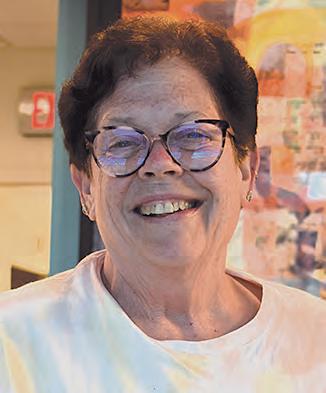
“Shelley has provided consistency and stability to the Blumkin Home Residents and staff all this time,” Executive Director Chris Ulven said. “A large part of the stellar reputation we have in the Omaha area is due to the exceptional care provided under Shelley’s direction. I’m guessing she has cared for around 3,000 residents in her time here, and she remembers almost every single one of them. She has been a fantastic Director of Nursing for the Community.” Shelley has taught others to work smarter, not harder. She knows how to troubleshoot, and how to manage conflict. She’s big on using critical thinking skills, and a master at helping new nurses get their footing. And those who have worked with Shelley know: the Residents always come first. She can solve any problem with logic, reason and kindness. She doesn’t like peppers on her food, and she’s easy to scare. She is resilient, she is a great communicator, she can solve problems and react appropriately to unexpected situations. She can remember someone’s name and who their son, daughter, mother, father, uncle, or cousin were. To most staff (not only at the RBJH) and community members, she’s such a familiar face at the Home, it’s impossible to imagine the place without her.
conclusion was that the very survival of Israel is at stake.
This community wide event drew a capacity crowd of 300 people because of its timeliness and the credentials of the speaker. In addition to the members of the Jewish and non-Jewish community, the lecture attracted Nebraska’s top elected officials, active See UNO Schwalb Center page 2
Shelly Tucker is the Rehab Coordinator, and has worked at the RBJH for 25 years.
“Shelley has been my boss the entire time,” she said. “It is a pretty scary thought to continue working here without Shelley running the ship! I do have faith that Erin Leutzinger will be able to fill her See Shelley Cash page 3
Continued from page 1 and retired military personnel from Offutt Airforce Base and USSTRATCOMM, and administrators, faculty and students from UNO and UNMC.

The Schwalb Center for Israel & Jewish Studies was pleased to co-sponsor the 2024 Ruth and Phil Sokolof Lecture with the UNO College of Arts and Sciences and The Jewish Federation of Omaha. The annual Sokolof lecture series is endowed by the Sokolof and Javitch families. Over the last decade, the series has featured internationally and nationally renowned speakers who have addressed important issues facing Israel.
Spencer pointed out that Hamas’s stated goal is not just the destruction of the Jewish state of Israel, but also the extermination of the Jewish people. He explained that Hamas, a terrorist organization and de facto governing power in Gaza, had repeatedly stated it was willing to sacrifice the Palestinian people to achieve its political goals. Contending that negotiating with Hamas was like negotiating with MS-13, an international criminal gang, Spencer said that from a military perspective Hamas had to be destroyed before a process of winning the hearts and minds of the Palestinian people could even begin. In response to criticisms that Hamas could not be wiped out and that Israel’s attacks would only result in creating more terrorists, Spencer replied that this was like saying, “You can’t kill the Nazi army because the German people won’t like it.”


Challenging claims that Israel has engaged in war crimes, apartheid and genocide, Spencer provided specific examples to the contrary and emphasized that Israel has followed internationally agreed upon rules of war (unlike Russia and Syria).
Going even further, Spencer made his most controversial point that Israel has done more than any nation in the history of war to prevent civilian casualties including using new and innovative information campaigns to inform and provide time for Palestinian refugees to flee before attacking specific areas and cities. The Israel Defense Forces also have reduced civilian deaths by employing facial recognition software to identify Hamas militants among refugee crowds. Spencer contended the world is responsible for the bulk of civilian deaths in Israel because the pressure on Israel to reduce and delay military force has enabled Hamas to rebuild fortifications and disrupt the distribution of humanitarian aid.
Spencer received a standing ovation
at the conclusion of his remarks. A full video of the 2024 Sokolof Lecture, including the question-and-answer period after the lecture, can be viewed on the Schwalb Center website. Limited copies of Spencer’s most recent book, Understanding Urban Warfare, are available from the Schwalb Center.
Prior to the event, a call for a boycott of Spencer’s lecture was circulated in the community and throughout campus. During the Schwalb Center event, thirty-five protesters, most covering their faces with masks, stood outside waving Palestinian flags and holding signs that read, “The Only Peace Israel Wants is Another Piece of Palestine” and “Down with Settler Colonial States” while chanting “Free, Free Palestine.” Another smaller group of community members who strongly disagreed with Spencer’s perspective chose to attend the event and listened respectfully to the speaker.
For more information on the Schwalb Center for Israel and Jewish Studies, contact us at unoschwalbcenter@un omaha.edu or 402.554.2788.

Continued from page 1
Created in 1972 in Miami by Norma Kipnis-Wilson and her friend Toby Friedland, both of blessed memory, the Lion of Judah program has brought together women of all ages and from many walks of life to play an essential role in promoting social justice, healing the sick, feeding the hungry, preserving human dignity, and building Jewish identity. Norma KipnisWilson, who died in 2021, was a powerhouse whose spirit touched countless lives and continues to do so. In 1970, when Jewish Women’s Philanthropy was considered the “Women’s Division,” she envisioned a path for elevating women’s significant leadership in the field. She believed in the enormous contribution that Jewish women were capable of making. This was groundbreaking philanthropy, unheard of for women at that time.
“A unique experience of being a Lion,” Nancy said, “is the worldwide sisterhood you gain when you join the Lion of Judah pride. Lions are generous, passionate, and inspiring women who work toward repairing the world. I wear my Lion pin with pride, because behind this beautiful pin, there’s a world of caring, strong, and committed women with one goal: be there when needed. I saw this when I first attended a national conference for JFNA and want to demonstrate my commitment by wearing my pin. I am proud to have my daughter-in-law, Stephanie Star, as a new Lion as well!”
The mitzvah of candle lighting is near and dear to Nancy’s heart; she often uses her mother’s candlesticks, which have a lot of meaning to her.
“Nancy is a metaphorical lamplighter in our community,” Shani Katzman said. “She works tirelessly to bring more light and joy wherever she goes: volunteering, recruiting, raising funds, being involved in any way she can help. Her manner of openly embracing her Judaism shows people how joyous it is to be Jewish and how meaningful it can be to be involved in the Jewish community.”
Nancy is particularly inspired by the Lion founders, Norma Kipnis-Wilson and Toby Friedland:
“They realized the power of women and women’s philanthropy,” Nancy said, “at a time when women weren’t giving so much in their own names. They would give under their husband’s names. The founders set a high goal to increase fundraising and were incredibly successful at doing that. Kipnis-Wilson and Friedland shared the belief that Lions do not start and finish; rather, they start and continue.”
Nancy enjoys being a vocal member in our community “because there is a need, and I truly care so deeply about our Jewish community. I want to take care of it, nurture it for those after me and encourage younger adults to see the power of leadership, whether it be through philanthropy or time.”
We invite you to join us in congratulating Nancy at our Jewish Federation of Omaha’s Awards Night & Annual Meeting on June 3 at 6:30 p.m. in the Alan J. Levine Theater on the Staenberg Kooper Fellman Campus.













JFO Community Engagement & Education
If you would like to feel good about growing up Jewish in Omaha and hearing the success story of someone who calls Omaha his “emotional home,” there is an event coming that might just be for you. On June 13 at 6 p.m., Nancy Rips will introduce and host Martin Sneider at The Bookworm located at 90th and Center. Call 402.392.2877 to reserve your spot and come prepared for a trip down memory lane as he relates his engaging, informative, and entertaining tales.

Sneider has been a leader in the shoe and clothing industries for more than five decades. Since 1992, he has served as an award-winning adjunct professor at Washington University’s Olin School of Business where he created and taught a course devoted to luxury goods, merchandising, and marketing. His teaching included trips with students to Milan, Paris, and London to visit the showrooms of Armani, Gucci, Louis Vuitton, Chanel, Burberry, and Cartier. A fourth-generation retailer, Sneider started as a shoe salesman and rose to president, chief merchant, and co-CEO of one of the nation’s largest fashion and shoe apparel specialty chains. In addition to his acclaimed debut novel, Shelf Life, and its sequel, Amy Unbound, he is the author of a nonfiction book on the shoe industry. He has two children and four granddaughters and lives in St. Louis, Missouri, and New York City.
Martin grew up in Omaha, attending Dundee Elementary School and graduating from Central High School. At the age of 7, he was working in his grandfather’s grocery store on N. 24th St. His grandfather immigrated to the United States with his family in the 1920s. Martin shared that he had two pivotal experiences in the grocery store business. He was exhilarated when his saba let him push the buttons on the cash register that opened the drawer, displayed the money, and produced a receipt. On the other hand, his necessary trips to the basement that held the dreaded “chicken plucker” were foreboding. Chicken-plucking aside, he grew to love the interactions and
Continued from page 1
shoes. What I admire about Shelley is that she runs a tight ship, but she is also the biggest Teddy Bear I have ever met. I was scared to death of her when I started working here, but she became one of my best friends who every morning shares her cheese stick with my dog, Stewie. I guarantee there is NOT ONE nursing home in the US that has had one Director of Nursing for as long as Shelley has been here.”
Erin Leutzinger started working at the Home in 2002, and after having been gone between 2016 and 2022, she is the current Nurse Manager.
“She hired me in 2002,” Erin said. “She was my boss for 17 years out of 22 and there are things she knows about this building that nobody knows. We will let some of Shelley Cash live on in this building for years to come!”
the immediate feedback of retailing.

Martin’s formative years of faith were at Beth El Synagogue under the guidance of Rabbi Myer Kripke. Ever industrious, at an early age he became a stock boy in draperies and carpeting at Nebraska Furniture Mart. He learned to write orders when one day Mrs. B. ordered him to “stop being a statue and learn how to write orders.” He did. Martin’s father was a buyer for Brandeis Department Store and taught Martin the language and process of retailing, including the mantra to “beat last year.” Martin will be sure to relate how at the age of 17 he became a shoe sales person for Chandler’s Shoes that was located within Brandeis. There’s much more, so you must come to The Bookworm on June 13 Martin began writing when his wife, Jill (of blessed memory), told him, “You can write!” Later, after fifteen versions of a book and the benefit of precise editing, he emerged with a book and the satisfaction of becoming a better writer. His first work of fiction, Shelf Life, focuses on the turmoil when a father, Max Feldman, and son, Josh Feldman, engage in a titanic struggle for power within a fashion shoe store. Max finally hands Josh a severance package. With the help of his wife, Amy, a brilliant lawyer, Josh sets out to take Max down. Martin will pick up the story at The Bookworm with the second volume of this five-part series, Amy Unbound. Again, demonstrating his gift for creating flesh-and-blood characters and compelling plots, Sneider captures the toll of the drive for success in a marriage while drawing readers into another volatile, adrenaline-fueled world: politics. Amy Unbound follows Amy as she throws herself into her work and begins to question her marriage. While Amy flirts with a dangerous romantic relationship and Josh comes to terms with the cost of his obsession with leading a fashion retail empire, broke and vengeful Max is stewing and scheming, waiting for the perfect chance to exact revenge on his son and daughter-in-law. Mark your calendar for June 13, 6 p.m. to be sure to meet and hear Martin Sneider at The Bookworm. Call 402.392.2877 to reserve your spot.
Shelly Fox, Director of Senior Outreach, has been in her position for 21 years.
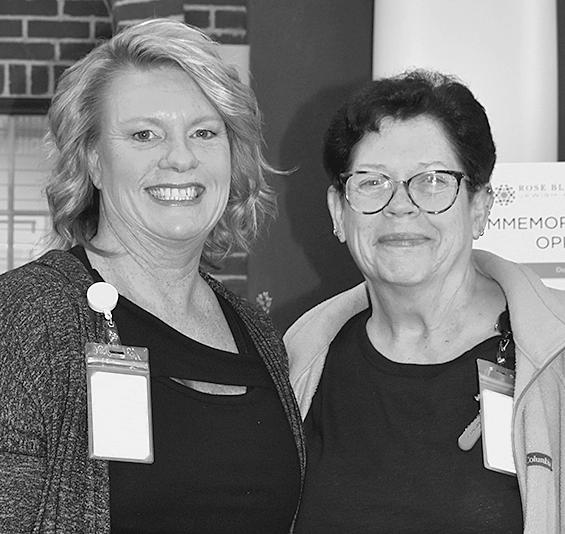
While her colleagues will miss seeing Shelley every day, knowing she is somewhere in the building, she’s leaving them with a few typical ‘Shelley-isms,’ according to Nurse Manager Natalie Osborne:
“Over the years, we have come to know all her favorite phrases. They include: “Are your hands painted on?”, “Six of one and half dozen of another,” “Not my monkeys, not my circus,” “It is what it is”, “If I have to be here, you have to be here,” “And people in hell want ice water,” and, last but not least, “If you kill them, you have to work their shift.”
“I will miss going to Shelley for guidance,” she said. “She always takes the time and provides important insight and attention when I need advice on how to better assist community clients. Life throws all of us challenges, and Shelley has faced adversity with dignity and strength. Her focus on doing the best for our Residents at the Home has never wavered.”
When Chris Ulven guessed 3,000 Residents, he wasn’t far off, according to Natalie:
“Looking at the first electronic medical record system we used, the first resident number was 298,” she said.
“Our current medical record system, the most recent admission is medical record number 2682. That makes 2,384 Residents, not including those that were here when we were doing manual charting and everything was on paper! It’s more if you look at readmissions, people that were here once, then discharged back to their home and returned to RBJH.”
Shelley’s name is well-known in the long-term care community, Natalie added. “You can go to a conference, mention you’re from RBJH and they will ask if Shelley Cash is still the Director of Nursing.”
Shelley, we all wish you the best, as you begin your next adventure; we also thank you for the tremendous impact you have had at our Rose Blumkin Jewish Home, and in our community.












Stairway to Heaven, Tears in Heaven, Manna from Heaven. Which one of these has connections with the biblical book of Exodus and is a godsend to aspiring journalists and perspiring headline writers alike?
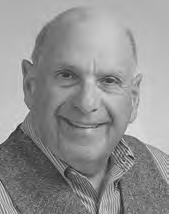
As recorded in Exodus 16, the Israelites had no sooner crossed the sea than they felt double crossed by the Lord: What, they grumbled, was the vaunted value of freedom when their stomachs were empty? In response, God “rained down bread from the sky... a fine and flaky substance as fine as frost on the ground. When the Israelites saw it, they said to one another, ‘Man hu?’ (‘What is it?’)—for they did not know what it was.” Later “the house of Israel named it manna; it was like coriander seed, white, and it tasted like wafers in honey.” Or, as narrated in Psalm 78: “To test God was in their mind when they demanded food for themselves. True, He struck the rock and waters flowed, streams gushed forth; but can He provide bread? God commanded the skies above, He opened the doors of heaven and rained manna upon them for food, giving them heavenly grain.”
Each aspect of this biblical story resonates over the years in popular press accounts. The West Australian provides a tasty story under the headline, Banana Manna from Heaven. The
“champion banana-cake baker is not a grey-haired lady [but] a middle-aged bloke with a beard, a Uniting Church minister” whose cooking prowess has filled charity coffers with an appropriately biblical bounty.
The worlds of entertainment and politics attract a huge number of people willing to squeeze the maximum amount of self-serving manna out of any phenomenon. Individuals as otherwise disparate as Mel Gibson and Michael Moore can be lumped together as “true believers who wear the thorned crown of victimhood, lashing out at anyone critical of their deeply held beliefs.” For both men, “controversy is like manna from heaven.”
But perhaps no one appeals to higher powers more than politicians: “State budget sees big bump in funds; revised revenue ‘manna from heaven’” (reports The Knoxville News-Sentinel); or “It was manna from heaven—the kind that means Salt Lake City taxpayers will face a smaller tax increase than previously expected” (The Deseret Morning News). Leave it to the editorial writers from The Chapel Hill Herald in Durham, North Carolina, to provide us with a dose of reality that’s reminiscent of the biblical prophets: “Almost inevitably, local governments act as if money provided by the federal government is ‘free money,’ like so much manna from heaven. But the fact is that federal money “doesn’t just fall from the sky.” That’s also true of state money, local money, and, alas, money in the Greenspoon budget. Manna from heaven—it ain’t!
‘intimidating’
WASHINGTON | JTA
One day before their university’s president was due to appear before Congress, hundreds of Jewish Rutgers University staff and students decried what they described as an intimidating campus environment for Jews.
“The entire university community has suffered through the disruption of normal university operations and an often chaotic and intimidating environment on our campuses,” said one letter released Wednesday by Rutgers Jewish Faculty, Administrators, and Staff, with 208 signatures.
a pledge to discuss divestment from Israel.
The letter from the students said Holloway deserved credit for resisting demands to cut ties with Tel Aviv University. “We are thankful that President Holloway has justly defended and reaffirmed our relationship with Tel Aviv University,” it said.
The letter from staff and faculty faulted Holloway for agreeing to some of the demands of the protesters to end an encampment, including the divestment discussion.
“The administration’s decision to accede to the demands of the encampment protesters undermines the principles of





A separate letter from close to 160 Jewish students at New Jersey’s flagship state university, also released Wednesday, referred to allegations that national anti-Israel groups funded and organized the protests against Israel’s war with Hamas.
“Student groups connected to national organizations quickly mobilized in support of terror, conveying to us that we would not be safe and welcome at the university many of us called home,” it said. The letter called for enforcement of the university’s code of conduct.


The letters from Jewish staff described 15 incidents and patterns of what it said were antisemitic actions, including “the sustained disruption of campus events,” “a death threat against Israeli students” and “a Jewish student whose likeness was used on anti-Israel posters without her permission.”
The letters were released a day before Jonathan Holloway, Rutgers’ president, appears before a congressional hearing on campus antisemitism on his campus. Hearings last year led to the resignations of the presidents of Harvard and the University of Pennsylvania, and Republicans on the committee say they hope to effect more resignations.
A protest encampment timed to the testimony of Columbia University’s president last month kicked off a national movement of controversial student demonstrations, some of which ended in arrest and some of which were dismantled following agreements between the administration and protesters. Rutgers protesters struck a deal with their administration that included steps to make Palestinian students feel welcome and
shared governance, and it elevates the voices of a radical few above those of the more reasonable whole,” it said.
Both letters indicated that they understood university leaders were sympathetic to Jews’ concerns, but did not do enough.
“While some university leaders have displayed good intentions, their words and deeds have been incommensurate with the magnitude of the problem,” said the letter from the staffers.
Two New Jersey Democrats in Congress, Reps. Josh Gottheimer and Donald Norcross, earlier this month wrote to Holloway expressing concern “that Rutgers appears to have incentivized people to act in a lawless and threatening manner by appeasing the demands of violent and hateful agitators while ignoring an analogous set of requests made peacefully to the University.”
The Department of Education last December opened an investigation into allegations of harassment of Jewish and Israeli students at Rutgers following the Oct. 7 launch of the IsraelHamas war.
On June 25, Beth El Synagogue will host the annual Yahrzeit of Jennifer Beth Kay. Services start at 5:30 p.m., followed by speaker Dr. Lillia Cherkasskiy, a Family Medicine Doctor at OneWorld Health Centers, and an Associate Program Director of the Family Medicine Residency at Creighton University. The presentation will also be shared on Zoom.
Since Jennifer’s death by suicide in 2017, her parents Helen and Les Kay have set up the Jennifer Beth Kay Memorial Fund at the Jewish Federation of Omaha Foundation.
“Through your generosity we have helped individuals, schools, religious institutions and organizations regarding mental health services, information and programs,” Les said in 2023. Previous yahrzeit speakers have been Congressman Don Bacon; Scott Anderson, Founder of At Ease USA and Julia Hebenstreit, Executive Director of the Kim Foundation.
Together, we will explore representations of Jewish suffering and mental illness throughout the Torah, the Talmud, and modern Jewish writing.
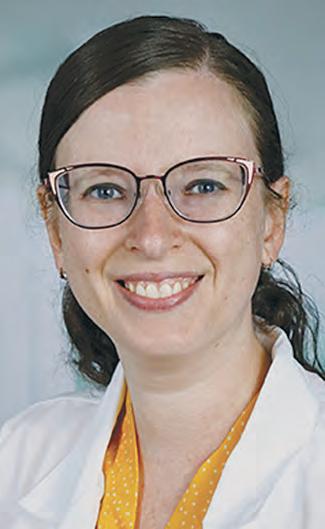
Dr. Cherkasskiy will also discuss the disproportionate amount of influence that Jews have had on the field of Psychology, including contributions to research about the prevention and treatment of suffering and mental illness.
“I will also share some personal experiences that I have had as a physician who often has the privilege of treating patients with mental illness,” she said. “My work in this area has been extraordinarily rewarding, and I hope to convey that from the medical perspective, we are getting better and better at screening for, treating, and supporting individuals living with mental illnesses. Finally, I will share evidence-based strategies for supporting friends and family members living with these illnesses.”
The Rose Blumkin Jewish Home has begun its renovation, bringing needed updates and improvements. It’s something that cannot be done without donors who care deeply about continuing the level of care the Blumkin Home is known for. This week, we hear from Justin and David Kohll.
JUSTIN:
Our family gave to this project, because I feel comfortable with the staff and patient care at the RBJH for Jewish families, and I like to see it continue. When you feel it’s time, there is a place where you can send your family for long term care with a Jewish culture.
The Home is where we sent my parents and it allowed them to stay together in the same room, until my mom passed away. My dad is still a Resident.
facility provides to our Jewish community, it was obvious we needed to do our part. It’s necessary to take excellent care of your elders and those needing additional care. For these reasons, and the fact that my father is a current Resident, it’s important to me. Our RBJH provides long-term care in a facility that welcomes Jewish people with many of the Jewish traditions they grew up with.
“I am honored,” Dr. Cherkasskiy said, “to be giving a talk at Beth El in honor of the Yahrzeit of Jennifer, daughter of Les and Helen Key. The title of my talk will be: To cry in Jewish: A joyful Discussion of Mental Health and Resilience in the Jewish Community. Jewish author Jonathan Safran Foer has suggested that a suffering Jew is seen and not heard, because through generations of oppression, Jews have learned to cry silently.
“To cry in Jewish” is an idea from modern Jewish author Johnathan Saffran Foer, and “refers to the idea that Jewish crying (or suffering) can look like laughter or tears, or anything really, nobody knows and nobody gets to define it,” she said.
If you are feeling suicidal and need immediate help, dial 988. We all have so much joy and gratitude in our lives to live, see and enjoy, so please take care of your mental wellbeing.
It’s a place where Jewish families can feel safe to send their loved one when the time comes.
We should all care about this project because it will allow us to keep the facility updated with the latest technology for future residents.
DAVID:
After seeing what a Jewish long term care
It’s not only important to provide a longterm care facility that is welcoming to Jewish people, ‘Welcoming ‘includes Jewish activities, so they feel comfortable with who they are. They may or may not choose to participate, but at least they have the choice. If you don’t keep up a long-term care facility, it will eventually close. We want those who need this type of home to have one that is the best in the nation. One we can be proud to have our loved ones living in, and one that is comfortable for them to live in. The Rose Blumkin Jewish Home has been meeting this standard, but we must invest again to keep us at the upper echelon.



Top, above, below and bottom: The Rose Blumkin Jewish Home and Friedel Jewish Academy have teamed up for a wellness program with HERE Mindfulness. This program provides a platform for participants to deepen their understanding of Hakarat HaTov, a concept in Judaism that encourages gratitude and the recognition of life’s blessings. HERE Mindfulness (HERE for You, For Them) is a unique program in Omaha that promotes creative activities, fostering calm, healing, and connection, inviting participants on a journey of self-discovery and wellness. The participants did a program of Blessing and Gratitude using M&M colors to represent new beginnings, passion and hobbies, love, nature, and friendships. A great scholar once said, “Who is Rich? Those who rejoice in what they have”. The HERE Mindfulness encouraged the very essence of Hakarat HaTov by examining and reflecting on our blessings.




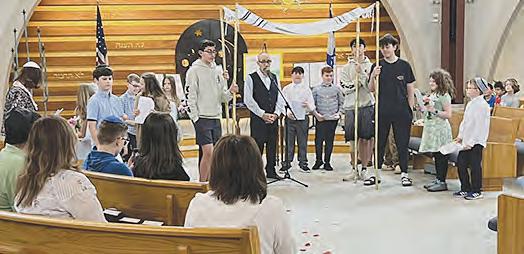



PHOTOS FROM RECENT JEWISH COMMUNITY EVENTS
SUBMIT A PHOTO: Have a photo of a recent Jewish Community event you would like to submit? Email the image and a suggested caption to: avandekamp@jewishomaha.org



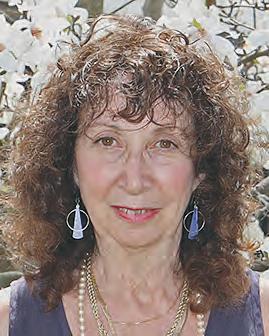
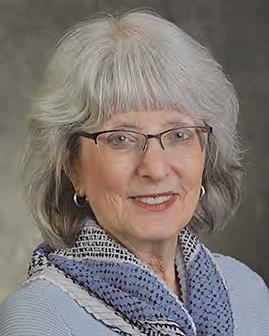
 SCOTT LITTKY
SCOTT LITTKY
Institute for Holocaust Education Executive Director
The June IHE 3rd Thursday Lunch & Learn program will be on Thursday, June 20 at 11:30 a.m. on ZOOM.
Rita Benn, Joy Wolfe Ensor and Fran Lewy Berg, co- editors and authors of the book: The Ones Who Remember; SecondGeneration Voices of the Holocaust will be our speakers. The Ones Who Remember: Second-Generation Voices of the Holocaust provides a window into the lived experience of sixteen different families grappling with the legacy of genocide. Each author reveals the many ways their parents’ Holocaust traumas and survival seeped into their souls and then affected their subsequent family lives – whether they knew the bulk of their parents’ stories or nothing at all.

In the book, several of the contributors’ children share interpretations of the continuing effects of this legacy with their own poems and creative prose. Despite the diversity of each family’s history and journey of discovery, the intimacy of the collective narratives reveals a common arc from suffering to resilience, across the three generations. The book offers a vision of a shared humanity against the background of inherited trauma that is relatable to anyone who grew up in the shadow of their parents’ pain.
For more information or to register, please email Scott Littky at slittky@ihene.org

One of the unfortunate responsibilities of a principal is discipline. We all know the feeling of dread as you walk to the principal's office (or maybe you were a better student than I was...). Rabbi Mandelbaum was the principal of a school in Lakewood, New Jersey. When a student was sent to his office, he would set them straight! But at the end of their discussion, he would always say, and before you go to class, I hope you know I love you. Once, he leaves his office and finds Yitzchak (one of his regular customers) sitting in the hallway. Rabbi Mandelbaum asked Yitzchak, “Why didn’t you return to class like I told you to?” Yitzchak replied, “Rabbi, you forgot to say I love you.”
In this week's parsha, G-d seems to give us an ultimatum. If you go in My ways, things will be good for you, but if you don’t, they will not be. From reading these verses, it could seem that G-d is harsh and vengeful. And I think we all have moments where we believe that is true. And we become full of anger and resentment at the way G-d has treated us. However, we have forgotten the promise G-d made to us. That He will never abandon us. He is our Father, and we are his children. And so when times are tough, we turn our backs on G-d; we walk away before we can hear Him whisper, “I love you so much.” So the next time you feel hurt or angry, tell G-d how you feel, and wait a little to see how He responds.
If you do business with any of our advertisers, please tell them you saw their ad in the Jewish Press. It really helps us!





and
Family Service
Social justice, advocacy and Hillel’s development of the concept of Tikkun Olam and what it means for us today. A Community Conversation on Rabbi Telushkin’s book, Hillel: If Not Now, When?
Friday, June 7 | 8:30-10:30 a.m. Wiesman Reception Room
RSVP’s required to Pam Monsky, pmonsky@jewishomaha.org or 402-334-6572 by Monday, June 3.

(Founded in 1920)
Margie Gutnik
President
Annette van de Kamp-Wright
Editor
Richard Busse
Creative Director
Howard Kutler
Advertising Executive
Lori Kooper-Schwarz
Assistant Editor
Gabby Blair
Staff Writer
Sam Kricsfeld
Digital support
Mary Bachteler
Accounting
Jewish Press Board
Margie Gutnik, President; Abigail Kutler, Ex-Officio; Helen Epstein; Andrea Erlich; Seth Feldman; David Finkelstein; Ally Freeman; Mary Sue Grossman; Chuck Lucoff; Suzy Sheldon; Joseph Pinson and Larry Ring.
The mission of the Jewish Federation of Omaha is to build and sustain a strong and vibrant Omaha Jewish Community and to support Jews in Israel and around the world. Agencies of the JFO are: Institute for Holocaust Education, Jewish Community Relations Council, Jewish Community Center, Jewish Social Services, Nebraska Jewish Historical Society and the Jewish Press Guidelines and highlights of the Jewish Press, including front page stories and announcements, can be found online at: www.jewishomaha.org; click on ‘Jewish Press.’ Editorials express the view of the writer and are not necessarily representative of the views of the Jewish Press Board of Directors, the Jewish Federation of Omaha Board of Directors, or the Omaha Jewish community as a whole. The Jewish Press reserves the right to edit signed letters and articles for space and content. The Jewish Press is not responsible for the Kashrut of any product or establishment.
Editorial
The Jewish Press is an agency of the Jewish Federation of Omaha. Deadline for copy, ads and photos is: Thursday, 9 a.m., eight days prior to publication. E-mail editorial material and photos to: avandekamp@jewishomaha.org ; send ads (in TIF or PDF format) to: rbusse@jewishomaha.org
Letters to the Editor Guidelines
The Jewish Press welcomes Letters to the Editor. They may be sent via regular mail to: The Jewish Press, 333 So. 132 St., Omaha, NE 68154; via fax: 1.402.334.5422 or via e-mail to the Editor at: avandekamp@jewishomaha.org.
Letters should be no longer than 250 words and must be single-spaced typed, not hand-written. Published letters should be confined to opinions and comments on articles or events. News items should not be submitted and printed as a “Letter to the Editor.”
The Editor may edit letters for content and space restrictions. Letters may be published without giving an opposing view. Information shall be verified before printing. All letters must be signed by the writer. The Jewish Press will not publish letters that appear to be part of an organized campaign, nor letters copied from the Internet. No letters should be published from candidates running for office, but others may write on their behalf.
Letters of thanks should be confined to commending an institution for a program, project or event, rather than personally thanking paid staff, unless the writer chooses to turn the “Letter to the Editor” into a paid personal ad or a news article about the event, project or program which the professional staff supervised. For information, contact Annette van de Kamp-Wright, Jewish Press Editor, 402.334.6450.
Postal
The Jewish Press (USPS 275620) is published weekly (except for the first week of January and July) on Friday for $40 per calendar year U.S.; $80 foreign, by the Jewish Federation of Omaha. Phone: 402.334.6448; FAX: 402.334.5422.
Periodical postage paid at Omaha, NE. POSTMASTER: Send address changes to: The Jewish Press, 333 So. 132 St., Omaha, NE 68154-2198 or email to: jpress@jewishomaha.org
Editorials express the view of the writer and are not necessarily representative of the views of the Jewish Press Board of Directors, the Jewish Federation of Omaha Board of Directors, or the Omaha Jewish community as a whole.
In a recent JTA article, Andrew Lapin wrote: “A middle school teacher in Connecticut was reportedly suspended following a lesson on the Holocaust in which they asked students to draw a swastika in their notebooks, list positive things Adolf Hitler did for Germany and comment on a baby photo of the Nazi leader that the teacher described as ‘cute.’”
Then there was the middle school outside Atlanta where students were asked to rate Hitler as a ‘solution seeker’ and an ‘ethical decision maker.’
Lapin continued: “In 2013, students at a high school in New York were told to ‘argue that Jews are evil, and use solid rationale from government propaganda to convince me of your loyalty to the Third Reich!’ In 2021, an elementary school in New Jersey faced backlash for an assignment in which a student wrote a positive biography of Hitler and dressed up as him. Later that same year, teachers in Texas were instructed to present ‘opposing’ views on the Holocaust as part of a policy to teach multiple perspectives on ‘widely debated and currently controversial’ topics.”
It feels, when it comes to Holocaust education in the US, we take ten steps back for every single step forward. Why on earth would a middle school teacher even look for a photo of baby Adolf? I don’t get it.
It’s funny, how the current backlash so quickly drags the Holocaust into it - as if by excusing the Nazis, people can justify what Hamas and Hezbollah stand for. As if the world at large just wants to
return to a time when antisemitism was completely mainstream, normalized, when there was no independent State of Israel to muddy the antisemitic waters. What do they want? Step one: get rid of Israel, step two: everyone back in the diaspora so we’re less of a threat; is that what this is? Don’t they know by now that we’ll push back harder and faster than ever?
As much as we don’t understand why so many people hate us, they in turn don’t understand that what we have and who we are is worth fighting for. What’s more, we fight in a variety of ways, including doubling down on our Jewish joy. When UCLA canceled their commencement, the local Hillel set up a graduation ceremony for the Jewish students, including all the bells and whistles and lots of guests. When the outcry to exclude Israel from Eurovision, Eden Golan sang anyway, and she did so beautifully. Jewish summer camps are sold out near and far, Jewish students are speaking out and many of them report feeling more Jewish than ever. If you boo Jerry Seinfeld when he takes the stage, will that make him more Zionist or less? If you burn a Sarah J. Maas book because the author once upon a time participated in
Birthright and enjoyed it, how many of her books do you think we’ll buy?
They think we have the banks and Hollywood, and a secret cabal that runs the world. It’s obvious we don’t. What we do have: Judaism, Torah, our syn-

agogues and Hillel. We have Sara and Abraham, Rebecca and Isaac, and Rachel and Leah and Jacob. We have Chabad and Jewish Community Centers and Jewish Federations. We have Rosh Chodesh and Shabbat candles, we have challah and latkes and Elite chocolate and Bamba. We have Day Schools and public Hanukkiah lightings; we have Sukkahs in our backyards and we have bagels with shmears. Most of all: we have each other. And that is something that is so valuable, they’ll never take that away from us. A baby picture of Hitler? It’s nothing.
JONATHAN BRANFMAN
JTA
Breathless headlines have tracked the recent “Great Rap War” between Drake, a biracial Jewish Canadian rap superstar, and Kendrick Lamar, a Black non-Jewish American rap superstar.
Over the past few weeks, Drake and Lamar have bashed each other with unusually scathing, highprofile and rapid-fire diss tracks, which have garnered coverage even from flagship newspapers like the New York Times and the Wall Street Journal. As a scholar of Jewish identity, race and gender in popular culture, I have followed those headlines to continue my research on Drake, one of the key performers examined in my forthcoming book, “Millennial Jewish Stars: Navigating Racial Antisemitism, Masculinity, and White Supremacy.”
My take: While it is tempting to dismiss the feud as a marketing ploy or a frivolous distraction from weightier issues, the Drake-Kendrick Lamar beef also illuminates broader patterns in the way that American society envisions rap authenticity, race, class, masculinity and Jewishness.
Within this feud, Lamar’s diss tracks have leveled two core accusations against Drake. First, Lamar references allegations that Drake may prey upon underaged girls — for example, the 2018 revelation that Drake (then 32) had initiated a close texting relationship with actress Millie Bobby Brown (then 14). Kendrick’s rap calls Drake a “pervert” and “pedophile” who “should be placed on neighborhood watch.”
Despite the seriousness of this sexual allegation, a great deal of public reaction to the feud has focused on Lamar’s second key accusation: that Drake — biracial, Canadian, Jewish, and a former teen soap opera actor who grew up middle-class — is inauthentic as a representation of rap’s essential African-American culture. Lamar’s lyrics thus highlight American society’s ongoing debates about how to define and redress cases of cultural appropriation, caricature and exploitation.
Lamar’s diss tracks extend the long-running and commonplace view that Drake isn’t Black enough, that his performances steal from Black culture and that Drake’s attempts to perform Black masculinity are offensive or pathetic counterfeit imitations. Lamar conveys these accusations through lyrics that
call Drake “off-white” rather than Black, order Drake to stop saying the N-word, and inform Drake that “you not a colleague, you a f—ing colonizer” within the rap industry. Lamar also challenges Drake’s masculinity, calling him a “pussy” and a “bitch.”
This type of invective about Drake’s Blackness and masculinity has circulated nearly since Drake first broke into the U.S. rap industry in 2006-2010, and it has continued to coexist with his spectacular musical success. For example, although Drake was named Artist of the Decade by the 2021 Billboard Music Awards, a staggering number of online “Drake memes” mock him as “not really Black,” “not a real man” and “not a real rapper.”
Since long before the recent feud, the rap industry has often predicated rap authenticity on specific notions of Black American hypermasculinity, a gender style that the African American Studies scholar Imani Perry describes as “doublevoiced.” This hypermasculine archetype titillates white suburban audiences with racist fantasies about hypersexual and criminal Black men, while also offering models of power and dignity to some Black men who experience powerlessness in a racist society. But whether conveying racism or Black dignity, this model of masculinity often requires dark skin, which popular stereotypes equate with harder masculinity, and an impoverished upbringing in ghettoized Black neighborhoods of American cities, such as Kendrick Lamar’s hometown of Compton, California.
position Drake as an inauthentic Black man and thus an inauthentic rapper. For example, early in Drake’s career, CBS News’ Katie Couric illustrated the way that popular stereotypes of “soft” Jewish masculinity could undermine his rap credibility: When interviewing Drake in 2010, Couric immediately asked, “What’s a nice Jewish boy doing in a career like this?”

In contrast to this industry norm, Drake — born Aubrey Drake Graham — is a light-skinned biracial man raised more or less middle-class by his Canadian Ashkenazi Jewish mother within an affluent neighborhood of Toronto. Drake was also a teen actor from 2001 to 2008 on the schmaltzy Canadian soap opera Degrassi: The Next Generation, in which he played an artistic and gentle middle-class student who eventually becomes wheelchair-bound and experiences erectile dysfunction.
In the context of American rap, all of these traits
Even for viewers unfamiliar with stereotypes about “soft” Jewish men, Jewishness is often associated with whiteness, fueling the misperception that Jewish identity undermines authentic Blackness. Drake himself has discussed the perception: Early in his rap career, he told Heeb magazine, “I went to a Jewish school, where nobody understood what it was like to be black and Jewish.” While this miscomprehension led some of Drake’s classmates to question his Jewishness, it motivates some audiences today to question his Blackness. But if Drake’s skin tone, class upbringing, Jewish identity and acting resume all distance him from rap industry norms, then his efforts to close that distance have often just marked him as even more inauthentic, and even as exploitative. Over time, Drake has striven to better align his image with the industry’s model of Black hypermasculinity. For example, he revealed new muscles after a regimen of bodybuilding in 2015 and he revealed his hair in new cornrows in March 2022.
See ‘Great Rap War’ page 9
New York Jewish Week via JTA
“I’ve always wanted to write about the Holocaust,” the playwright Moisés Kaufman, son of a Romanian Holocaust survivor, told me this week. “But it’s the one thing in history that has been most written about. What is there new to say?”
One answer came in an article on the front page of the New York Times, dated Sept. 19, 2017, about a remarkable album of photographs donated anonymously to the U.S. Holocaust Memorial Museum. More than 100 carefully mounted snapshots depict Nazi soldiers and unidentified young women in relaxed poses — sunbathing, enjoying an accordion recital, eating bowls of blueberries on a length of fence.
Thanks to the detective work of a young archivist named Rebecca Erbelding, the photos began to give up their secrets. They were taken and collected between 1944 and 1945 by Karl Höcker, the adjutant, or righthand man, to Rudolf Höss, the commandant of Auschwitz.
around the Israel-Hamas war when Glazer spoke in his Oscars speech of Israel’s “dehumanizing” occupation. Kaufman noted that he began work on his play seven years ago, and says he leaves it to the audience “to have a conversation with the play about not only who they are but about what’s happening in the world.”
What separates Blueberries from other works about the Holocaust, and avoids what one critic calls Holokitsch, is its forensic examination of the perpetrators. (The play is set in the
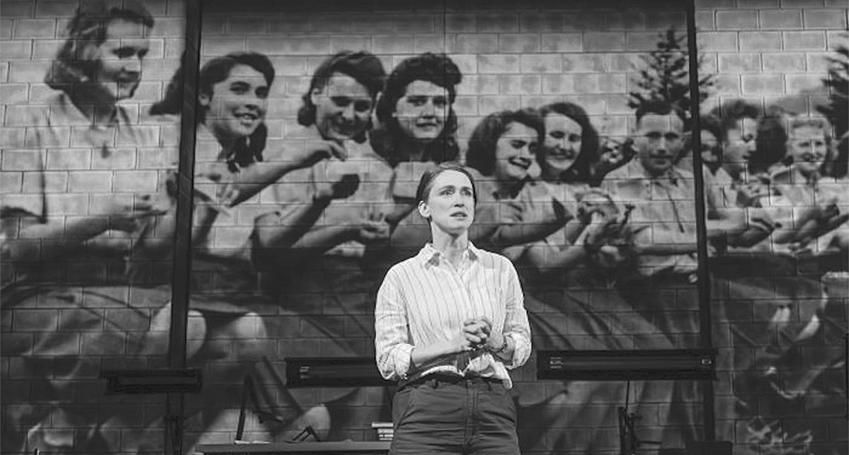
They include high-ranking architects of the Nazi death machine, including Josef Mengele, the death camp’s notorious and rarely photographed “angel of death.” They show camp guards and their families relaxing at Solahütte, a spa built on the far reaches of the camp complex.
Elizabeth Stahlmann plays a Holocaust museum archivist in Here There Are Blueberries
Credit: Matthew Murphy
What they don’t depict are any of the 1.1 million Jews being exterminated by and under the direction of the officers and flunkies seen smiling in what Kaufman’s frequent collaborator, Amanda Gronich, calls “the selfies of an SS officer.”
The Venezuelan-born Kaufman, best known for The Laramie Project, a play and HBO film about the murder of the gay student Matthew Shepard, had found his latest subject.
“We’re trying to understand something profound about the people in the photographs,” Kaufman said. “I always felt if we did our job correctly, the play would speak to many moments in history, because the play basically deals with this idea that there’s a continuum between culpability, complicity and complacency.”
The result of his latest collaboration with Gronich, Here There Are Blueberries is now playing at New York Theatre Workshop, in a taut, 90-minute production that was a finalist for this year’s Pulitzer Prize in drama. Based on interviews with its subjects, the play puts Erbelding (Elizabeth Stahlmann) at the center of what the co-authors call a “detective story” — less a whodunit than an exploration of why they did it and, perhaps most chillingly, what separates these former clerks, bank tellers and teenage girls from the rest of us.
“We were trying to take away any ability from the audience members to create a distance between what the Nazis did and we are all capable of doing,” said Kaufman in a joint Zoom call with Gronich. “The Nazis were not monsters — they were normal people who did monstrous things. And if you can keep that in your brain, as uncomfortable as that is, then you have to ask yourself the question: What would I do in that situation?”
Blueberries joins a long list of recent plays focusing on the Holocaust, including Tom Stoppard’s Broadway hit Leopoldstadt, Joshua Harmon’s Prayer for the French Republic, a new Cabaret revival and, returning this fall after a staging at the Brooklyn Academy of Music, Our Class, about a 1941 pogrom in a Polish village.
The play also arrives on the heels of The Zone of Interest, Jonathan Glazer’s Oscar-winning film about Höss, which similarly depicts Nazi families gamboling in the shadow of the death camp. The Höss family photos also are featured in Blueberries, accompanying the testimony of one of the commandant’s appalled and repentant grandsons. Höss’ son is the subject of an upcoming Warner Bros. Pictures documentary, The Commandant’s Shadow
When I asked about the confluence of the films and his play, Kaufman noted that projects on similar topics often arrive at the same time. But he also noted trends in Holocaust scholarship, which in the past 10 years or so has shifted attention from the victims to the perpetrators. In 2017, for instance, Clark University’s Strassler Center for Holocaust and Genocide Studies held an international conference on “perpetrators and justice,” and the human rights lawyer Philippe Sand has written a number of recent books about high-ranking Nazis and their families.
Gronich also suggested that scholars want to gather these stories before it is too late. “Just as the survivors are disappearing, so too are the perpetrators,” she said. “We’re about to lose all the witnesses.”
The Zone of Interest became a talking point in the discourse
archivists’ laboratory, with the photographs projected behind them in exquisite, chilling detail.) In the play, Judith Cohen, a real-life curator at the museum (played by theater legend Kathleen Chalfant), reminds Erbelding that the mandate of the museum is to elevate and memorialize the victims, not the perpetrators. The two debate whether displaying the photos will somehow “normalize” the Nazis or traumatize survivors.
Two other shifts in focus (a phrase to be taken almost literally in a play that begins with a spotlight on the portable Leica camera popular in war-time Germany) also distinguish the play. Kaufman and Gronich introduce Tilman Taube, a German businessman who saw the Höcker photographs in a German newspaper and recognized his grandfather, a doctor, in an SS uniform. Taube’s interviews with the children and grandchildren of other perpetrators seen in the photos produce some of the play’s most startling monologues.
Finally, the play pivots once again to include the testimony of Lili Jacob, an Auschwitz survivor who, while recovering from typhus at a camp hospital, discovered yet another album of photos taken by the SS. These include photographs of her and the moment when the rest of her family were selected for the gas chambers. As the photos are shown behind her, Stahlmann offers Jacob’s testimony — images and words that the Germans tried desperately to keep out of the frame.
“I’ve been doing theater for 40 years now,” said Kaufman. “I have never heard the kind of silence that I hear in the audience when they’re watching this play.”
In a talkback after May 15th performance, Menachem Rosensaft, an attorney and former official of the World Jewish Congress who was born to survivor parents at the BergenBelsen displaced persons camp, said Blueberries was “one of the strongest and most powerful depictions of the Holocaust that we have.”
And perhaps that’s because while the show tells an intensely specific story, it also widens the lens to place important demands on the audience. The play takes its name from the photograph of those women enjoying a snack on day off from staffing the phone lines and Telex machines at the death camp’s communications center.
The play asks: How much did they know? But another question stuck with me hours after I left the theater: What would it take for my friends and neighbors — what it would take for me — to be pulled into or turn a blind eye to a system of barbarity or lawlessness in the name of country or an ideology?
“What happens when an ideology, a group think, captures the imagination of a nation?” said Gronich. “What happens when you are coming from a place of deep-seated belief that what you were doing is necessary — that what you were doing is the right thing?”
New York Theatre Workshop (79 East 4th St.) presents Here There Are Blueberries through June 30. A co-production with Tectonic Theater Project, it is co-written by Moisés Kaufman and Amanda Gronich and conceived and directed by Kaufman. Andrew Silow-Carroll is editor at large of the New York Jewish Week and managing editor for Ideas for the Jewish Telegraphic Agency.
The views and opinions expressed in this article are those of the author and do not necessarily reflect the views of NYJW or its parent company, 70 Faces Media.
This story was originally published on My Jewish Learning | JTA
My son’s hair is more unruly than usual, though that’s typical for this time of year. In our family, we follow the custom of not cutting our hair during the Omer, the 49 days between Passover and Shavuot.
The Omer is treated as a time of mourning — first marking the deaths of many thousands of Jews in the Bar Kochba revolt and subsequent plague in 132 CE, and later taking on

significance as the time of year when Ashkenazi Jews frequently experienced pogroms.
In a few weeks, we’ll get a reprieve — a picnic, maybe a haircut — on the 33rd day of the count, known as Lag Ba’omer (which this year falls on May 26). And we know we will end this period a little more than two weeks after that with the celebration of Shavuot, for not only have we survived massacre and plague, but we have received the Torah and have had harvests of plenty for thousands of years. This week, I find my heart as scraggly as the wilding beards I see on the Brooklyn subway, because we are not only midway through the Omer, but also just marked a trio of “yoms” — Yom Hashoah (Holocaust Memorial Day), Yom Hazikaron (Israeli Memorial Day) and Yom Ha’atzmaut (Israeli Independence Day).
In “Zakhor: Jewish History and Jewish Memory,” Yosef Hayim Yerushalmi calls our holiday observances acts of “ritual remembering,” a method by which Jewish collective memory is preserved through rituals, ceremonies and liturgical practices rather than just historical records. We don’t just hear about the Exodus from Egypt, we taste it as we eat matzah and saltwater at the Passover seder. We sing and See Jewish Holidays page 10
Continued from page 8
Likewise, Drake has shifted towards fashion choices that evoke ghettoized Black communities and has begun to speak more consistently in African American Vernacular English, both in performances and in public appearances. However, these changes always risk coming off as contrived because Drake’s early interviews and Degrassi performances suggest that he grew up speaking and dressing in accordance with white Canadian middle-class norms.
Indeed, a long line of critics, including Kendrick Lamar, have disdained these changes as proof that Drake is stealing from Black culture or caricaturing Blackness in order to shore up his marketability. For example, in the recent diss track Euphoria, Lamar raps, “I hate the way that you walk, the way that you talk/I hate the way that you dress.” In the diss track Meet the Grahams, Lamar raps, “The skin that you livin’ in is compromised in personas.”
In the wake of this rap feud, time will tell how Drake may continue to modulate his relationship to rap industry conventions, and how his future self-stylings will be received by peers and audiences. But however his individual image evolves, Drake will likely remain a high-profile barometer for the wider debates over cultural authenticity, ownership, and theft that all performers (both Jewish and non-Jewish) must navigate onscreen.
Jonathan Branfman is a postdoctoral fellow in the Taube Center for Jewish Studies at Stanford University, and the author of the forthcoming book, Millennial Jewish Stars: Navigating Racial Antisemitism, Masculinity, and White Supremacy.
The views and opinions expressed in this article are those of the author and do not necessarily reflect the views of JTA or its parent company, 70 Faces Media.
B’NAI ISRAEL SYNAGOGUE
618 Mynster Street Council Bluffs, IA 51503-0766
712.322.4705 www.cblhs.org
BETH EL SYNAGOGUE
Member of United Synagogues of Conservative Judaism 14506 California Street Omaha, NE 68154-1980
402.492.8550 bethel-omaha.org
BETH ISRAEL
SYNAGOGUE
Member of Union of Orthodox Jewish Congregations of America 12604 Pacific Street Omaha, NE. 68154
402.556.6288 BethIsrael@OrthodoxOmaha.org
CHABAD HOUSE
An Affiliate of Chabad-Lubavitch 1866 South 120 Street Omaha, NE 68144-1646
402.330.1800 OChabad.com email: chabad@aol.com
LINCOLN JEWISH COMMUNITY:
B’NAI JESHURUN
South Street Temple Union for Reform Judaism 2061 South 20th Street Lincoln, NE 68502-2797
402.435.8004 www.southstreettemple.org
OFFUTT AIR
FORCE BASE
Capehart Chapel 2500 Capehart Road Offutt AFB, NE 68123
402.294.6244 email: oafbjsll@icloud.com
ROSE BLUMKIN
JEWISH HOME
323 South 132 Street Omaha, NE 68154
TEMPLE ISRAEL
Union for Reform Judaism (URJ) 13111 Sterling Ridge Drive Omaha, NE 68144-1206
402.556.6536 templeisraelomaha.com
LINCOLN JEWISH COMMUNITY:
TIFERETH ISRAEL
Member of United Synagogue of Conservative Judaism 3219 Sheridan Boulevard Lincoln, NE 68502-5236
402.423.8569 tiferethisraellincoln.org
Monthly Speaker Series Service, Friday, June 14, 7:30 p.m. with our Bob Yaffe, he will discuss his book Relinquished. Our service leader is Larry Blass. Everyone is always welcome at B’nai Israel!
For information about our historic synagogue, please visit our website at www.cblhs.org or contact any of our other board members: Renee Corcoran, Scott Friedman, Rick Katelman, Janie Kulakofsky, Howard Kutler, Carole and Wayne Lainof, Ann Moshman, MaryBeth Muskin, Debbie Salomon and Sissy Silber. Handicap Accessible.
Services conducted by Rabbi Steven Abraham and Hazzan Michael Krausman.
IN-PERSON AND ZOOM MINYAN SCHEDULE:
Mornings on Sundays, 9 a.m.; Mondays and Thursdays, 7 a.m.; Evenings on Sunday-Thursday, 5:30 p.m.
FRIDAY: Kamp Kef, 9 a.m.; Kabbalat Shabbat 6 p.m.
SATURDAY: Shabbat Morning Service, 10 a.m. at Beth El & Live Stream followed by Kiddush Lunch in honor of Bob Epstein’s 85th Birthday; Havdalah, 9:35 p.m. Zoom only.
SUNDAY: Morning Minyan, 9 a.m. Zoom Only; Young Family Water Play, 2 p.m.
MONDAY: Women’s Book Group, 6:30 p.m. Zoom Only.
FRIDAY-June 7: Pre-Neg, 5:30 p.m. with Rabbi Telushkin; Kabbalat Shabbat 6 p.m. with Rabbi Telushkin at Beth El & Live Stream.
SATURDAY-June 8: Shabbat Morning Service, 10 a.m. at Beth El & Live Stream; Havdalah 9:40 p.m. Zoom only.
Please visit bethel-omaha.org for additional information and service links.
FRIDAY: Nach Yomi, 6:45 a.m.; Shacharit, 7 a.m.; Mincha/Kabbalat Shabbat, 7 p.m.; Candlelighting, 8:33 p.m.
SATURDAY: Shabbat Kollel, 8:30 a.m.; Shacharit 9 a.m.; Tot Shabbat 10:30 a.m.; Youth Class 10:45 a.m.; Tehillim, 7:05 p.m. at the Uzi’s; Soulful Torah, 7:35 p.m. with Rabbi Geiger; Mincha 8:20 p.m.; Laws of Shabbos/Kids Activity, 8:50 p.m.; Havdalah, 9:42 p.m.
SUNDAY: Shacharit, 9 a.m.; Kinyan, 9:40 a.m.; Mincha/Ma’ariv 8:40 p.m.
MONDAY: Nach Yomi, 6:45 a.m.; Shacharit, 7 a.m.; Mincha/Ma’ariv, 8:40 p.m.
TUESDAY: Nach Yomi, 6:45 a.m.; Shacharit, 7 a.m.; Kinyan, 8 p.m.; Mincha/Ma’ariv, 8:40 p.m.
WEDNESDAY: Nach Yomi, 6:45 a.m.; Shacharit, 7 a.m.; Mincha/Ma’ariv, 8:40 p.m.
THURSDAY: Nach Yomi, 6:45 a.m.; Shacharit, 7 a.m.; Character Development, 9:30 a.m.; Kinyan 8 p.m.; Mincha/Ma’ariv, 8:40 p.m.; Parsha Class, 9 p.m.
FRIDAY-June 7: Nach Yomi, 6:45 a.m.; Shacharit, 7 a.m.; Mincha/Kabbalat Shabbat, 7 p.m.; Candlelighting, 8:38 p.m.
SATURDAY-June 8: Shabbat Kollel, 8:30 a.m.;
Continued from page 9 feast to celebrate our liberation, and we care for the downtrodden because we know what it means to be enslaved. And yes, the old joke about typical Jewish holidays (attributed to Alan King) encapsulates our typical ceremonies succinctly: “They tried to kill us, we prevailed, let’s eat.”
This year, that process is more fraught than most. It has been only seven months since the massacres of Oct. 7, and we are still engulfed in a brutal war. How can we engage in acts of ritual remembering when we are living in between “they tried to kill us” and “we prevailed?”
Our processes of mourning and memory can provide some guideposts. When a close loved one dies, we sit shiva, seven days at home in which our community ensures we do not grieve alone. Friends provide food and comfort, listening as we share raw expressions of loss and memory. We aren’t ready to make meaning. It is too soon with our fresh losses and ongoing trauma. Instead, we gather, share stories and support those in the depths of grief, collectively waiting for the time when we might begin to make meaning.
Shacharit 9 a.m.; Tot Shabbat 10:30 a.m.; Youth Class, 10:45 a.m.; Tehillim, 7:15 p.m. at the Uzi’s; Soulful Torah, 7:45 p.m. with Rabbi Geiger; Mincha, 8:30 p.m.; Laws of Shabbos/Kids Activity 9 p.m.; Havdalah, 9:47 p.m.
Please visit orthodoxomaha.org for additional information and Zoom service links.
All services are in-person. All classes are being offered in-person and via Zoom (ochabad.com/academy). For more information or to request help, please visit www.ochabad.com or call the office at 402.330.1800.
FRIDAY: Shacharit, 8 a.m.; Inspirational Lechayim, 5:45 p.m. with Rabbi and friends: Ochabad.com/ Lechayim; Candlelighting, 8:32 p.m.
SATURDAY: Shacharit, 9:30 a.m. followed by Kiddush and Cholent; Shabbat Ends, 9:41 p.m.
SUNDAY: Sunday Morning Wraps: Shacharit, 99:30 a.m., Video Presentation, 9:30 a.m. and Breakfast, 9:45 a.m.; Torah and Tea, 10:30-11:15 a.m.
MONDAY: Shacharit, 8 a.m.; Personal Parsha, 9:30 a.m.; Intermediate Biblical Hebrew Grammar, 10:30 a.m. with Prof. David Cohen; Parsha Reading, 6 p.m. with Prof. David Cohen.
TUESDAY: Shacharit 8 a.m.; Cooking Club Lunch Clutch, 11:30 a.m.-1 p.m. at Chabad, ochabad.com/ lunchclutch; Intermediate Biblical Hebrew Grammar, 6 p.m. with Prof. David Cohen; Introductory Biblical Hebrew Grammar, 7 p.m. with Prof. David Cohen.
WEDNESDAY: Shacharit 8 a.m.; Mystical Thinking (Tanya), 9:30 a.m.; Introductory Biblical Hebrew Grammar, 10:30 a.m. with Prof. David Cohen; Parsha Reading, 11:30 a.m. with Prof. David Cohen.
THURSDAY: Shacharit, 8 a.m.; Introduction to Alphabet, Vowels & Reading Hebrew, 10 a.m. with Prof. David Cohen; Advanced Biblical Hebrew Grammar, 11 a.m. with Prof. David Cohen; Talmud Study (Sanhedrin 34), noon; Introduction to Alphabet, Vowels & Reading Hebrew, 6 p.m. with Prof. David Cohen; Kitzur Shulchan Aruch (Code of Jewish Law) Class, 7 p.m.
FRIDAY-June 7: Shacharit 8 a.m.; Inspirational Lechayim, 5:45 p.m. with Rabbi and friends: Ochaba d.com/Lechayim; Candlelighting, 8:37 p.m.
SATURDAY-June 8: Shacharit 9:30 a.m. followed by Kiddush and Cholent; Shabbat Ends, 9:47 p.m.
LINCOLN JEWISH COMMUNITY: B’NAI JESHURUN & TIFERETH ISRAEL
Services facilitated by Rabbi Alex Felch. All services offered in-person with live-stream or teleconferencing options.
FRIDAY: Erev Shabbat Service with Rabbi Alex, 6:30-7:30 p.m. at SST; Shabbat Candlelighting, 8:33 p.m.
SATURDAY: Shabbat Morning Service, 9:30-11 a.m. at TI; Torah Study, noon on Parashat Bechukotai via Zoom; Havdalah, 9:42 p.m.
SUNDAY: Men’s Bike/Coffee Group, 10:30 a.m. in the Conference Room at Rock 'n Joe (5025 Lindbergh St.). For more information or questions please email Al
This sharing is the beginning of a narrative process during which memories become stories, eventually burnished into legacy when they motivate our actions.
My late father shared a poignant story from another challenging time in our history: Simchat Torah during the Yom Kippur War of 1973. With shades drawn down across Tel Aviv for air raids, every neighbor had a loss to mourn, a shiva to attend. Amidst the heavy grief and omnipresent reality of war, he suddenly heard sounds of singing. A throng was dancing with a Torah through the streets of secular Tel Aviv. They proclaimed, “If we cannot dance in the streets with the Torah, then what is the point of fighting at all?”
They knew the laws of sitting shiva are paused for Shabbat, and ended for the festivals. And they were following the teaching of Rav Nachman of Breslov, who said that it is forbidden to despair. As long as we carry forward Torah, as long as we reach toward and seek to reflect God’s light, we access a source of hope. As future ancestors, and descendants of Abraham and Sarah, we embody an indomitable spirit that affirms life even in the darkest of times.
Weiss at albertw801@gmail.com; Pickleball, 3-5 p.m. Anyone interested in playing or learning how to play can text Miriam at 402.470.2393. If there are enough interested people; we will play in the Social Hall at TI.
FRIDAY-June 7: Star City Pride Festival, 4-9 p.m. at the outdoor festival space in the Haymarket; Erev Shabbat Service with Rabbi Alex, 6:30-7:30 p.m. at SST; Shabbat Candlelighting, 8:38 p.m.
SATURDAY-June 8: Shabbat Morning Service, 9:30-11 a.m. at TI; Torah Study, noon on Parashat Bamidbar via Zoom; Star City Pride Festival, noon-9 p.m. at the outdoor festival space in the Haymarket; Havdalah, 9:47 p.m.
FRIDAYS: Virtual Shabbat Service, 7:30 p.m. every first and third of the month at Capehart Chapel. Contact TSgt Jason Rife at OAFBJSLL@icloud.com for more information.
The Rose Blumkin Jewish Home’s service is currently closed to visitors.
In-person and virtual services conducted by Rabbi Benjamin Sharff, Rabbi Deana Sussman Berezin, and Cantor Joanna Alexander
FRIDAY: Drop in Mah Jongg, 9-11 a.m. In-Person; Shabbat B’yachad Service: Scholar-in-Residence Rabbi Joseph Telushkin — Moral Imagination: On Being a Good Person In a Morally Complicated World, 6 p.m. In-Person & Zoom.
SATURDAY: Torah Study, 9:15 a.m. In-Person & Zoom; Shabbat Morning Service, 10:30 a.m. In-Person & Zoom.
SUNDAY: Temple Israel Annual Meeting, 10:30 a.m. In-Person.
TUESDAY: Adult Prayer Hebrew: Level Aleph, 6 p.m. In-Person.
WEDNESDAY: Yarn It, 9-11 a.m. In-Person.
THURSDAY: The Zohar: Thursday Morning Class, 11 a.m. with Rabbi Sharff and Rabbi Azriel — In-Person & Zoom; Adult Civil Rights Trip Informational Meeting, 7 p.m. In-Person.
FRIDAY-June 7: Drop in Mah Jongg, 9-11 a.m. InPerson; Shabbat B’yachad Service, 6 p.m. In-Person & Zoom.
SATURDAY-June 8: Torah Study 9:15 a.m. In-Person & Zoom; Shabbat Morning Service, 10:30 a.m. InPerson & Zoom; Movie Night for 20 Somethings, 7 p.m. In-Person. Please visit templeisraelomaha.com for additional information and Zoom service links.
The Jewish Press will be closed on Thursday, July 4 for Independence Day. The deadline for the July 12 issue is Tuesday, July 2, 9 a.m. There will be no Jewish Press on July 5, 2024. Questions? Call 402.334.6448.
What if we could, even now in fresh grief, still weather our despair with the memory of past redemptions? What if our rituals this year could reflect not only the sorrow of those we have lost but also our indomitable spirit, and a stubborn hope for peace and security? What if we allow ourselves this Shavuot to truly receive the gift of Torah to give us strength and hope?
As hair grows and tears flow through this Omer period, we add new stories of collective and personal sorrows. Someday our current sorrows will be memories, woven into the tapestry of our shared destiny, where time and again we “sow in tears and reap in joy,” in the words of the psalmist. As we count down to Shavuot, we are reminded that, just as we stood together at Sinai, we will once again gather in the celebration of Torah and the renewal it promises.
Rabbi Shira Koch Epstein is executive director of Atra: Center for Rabbinic Innovation. The views and opinions expressed in this article are those of the author and do not necessarily reflect the views of JTA or its parent company, 70 Faces Media.
Betsy Rose (Goldbarg) Davidson passed away on April 19, 2024 at age 95 in Omaha. A celebration of life was held on April 21, 2024 at Temple Israel and was officated by Rabbi Schraff and Cantor Alexander.
She was preceded in death by parents, Isadore (IG) and MIriam Goldbarg; and Arthur L. Davidson.
She is survived by her children, Mary-Beth Muskin (Bruce) and Doug Davidson (Juanita); grandchildren: Anne Muskin Brower (Matt), Emily Muskin Rathner (Jesse), Zachary Muskin (Jenni), Bryan Scholtes (Jamie), Brandon Scholtes, Sarah Buetel, Austin Davidson and Michelle Davidson. and her adoring great-grandchildren: Edie and Elle Brower, Henry and Max Rathner, Lena Muskin, Emma Kolbush (Derek) Nick, Grace and Zach Scholtes.
Betsy was born in St. Paul, Minnesota, the youngest child of Isadore (IG) and Miriam Goldbarg. She was a graduate of Central High School in the Twin Cities and attended the University of Minnesota where she met Arthur Davidson her husband of 69 years. Arthur and Betsy moved their family to Omaha in 1958 to run the Omaha branch of Davidson’s Furniture.
They raised 2 children, Mary-Beth and Doug in a beautiful house that Arthur designed and Betsy filled with animals, love
and furniture!
Together they enjoyed doubles tennis and friends for many years, loved traveling and learning about different cultures with trips to China, Afghanistan, Alaska and Israel. They regularly hosted Afghan students and even Chinese and Afghan weddings in their home. She leaves a legacy of love for candy, politics, humor, dogs named after Russian dictators, dinner parties, puns, odes and accessories.
Betsy was incredibly active in the Omaha Community and held leadership roles in the League of Women Voters, Great Books and was involved in the Afghan Studies program at the University of Nebraska Omaha. She was a long-standing board member and instrumental force of Tuesday Musical, responsible for bringing world class musicians and classical music to the city of Omaha. She was also active in the Sisterhood, Temple, and NCJW.
Betsy had a deep love for her family and friends and us for her. She will be greatly missed. She delighted everyone she came in contact with. A special thank you to caregivers, Ruthie, her caretakers at the Blumkin Home and Methodist Hospital.
Memorials may be made to the Arthur L. and Betsy Davidson Memorial Fund at the Jewish Federation of Omaha.
JULIA GERGELY
New York Jewish Week via JTA Move over, Snoop Dogg. Martha Stewart has a new collaborator — in New York City’s Israeli-style Breads Bakery. Known for its chocolate and cinnamon babkas, Breads is partnering with Stewart to promote the fourth season of her show Martha Cooks on Roku.
In honor of the show, Breads and Stewart created a limitededition Martha’s Good Thing Babka. The recipe is made with the same laminated dough that Breads uses in all its babkas, and is filled with poppy, golden raisins and citrus zest. It will be sold at Breads locations in New York City for $17.50 and on the food delivery site Goldbelly — where anyone around the country can order a 2-pack for $69.95 — starting Friday, May 17.
Martha as a guest and a friend of Breads Bakery is the ultimate seal of approval for me.”
The series as a whole features Stewart sharing her favorite recipes and techniques in her kitchen, while also venturing out to her favorite restaurants and working with a diverse array of chefs to learn more about the way they do things.

The celebrity chef and media maven has always made waves with her partnerships, especially after fostering an unlikely friendship and business relationship with the rapper Snoop Dogg over the last 15 years.
Stewart has visited Breads for segments on her shows multiple times in the past to feature the bakery’s cheesecake babka and strudel, but this is the first time the two have collaborated on a product.


HELLO NEBRASKA! Introducing www.nepublicnotices.com, a new public notice website presented as a public service by all Nebraska newspapers. Free access, fully searchable – because democracy depends upon open government and your right to know.
AFFORDABLE PRESS Release service. Send your message to 155 newspapers across Nebraska for one low price! Call 1-800369-2850 or www.nebpress.com for more details.
ATTENTION ADVERTISERS! For $225/25 word classified you can advertise in over 150 Nebraska newspapers. For more information contact the Jewish Press or call 1-800-369-2850.
In the season premiere of Martha Cooks, which aired on May 20, Stewart goes behind the scenes on Breads’ recipes with the bakery’s owner, Gadi Peleg. In the episode, the pair make Breads Bakery’s baguettes, challah and an egg sandwich.
“Having her at the bakery and creating this babka with her has been a dream come true,” Peleg said in a statement. “Working on a recipe with Martha Stewart is like collaborating on a song with Paul McCartney.”
Peleg said the first time he knew that Breads was onto something was when Stewart walked through the doors shortly after the bakery opened on West 16th Street in 2013.
“Many of us who have dedicated our lives to food and hospitality were inspired by Martha Stewart,” Peleg said. “Having


Stewart is no stranger to appreciating Ashkenazi Jewish food on her shows. In the sixth episode of Season 3 of Martha Cooks, titled The Bagel Show, Stewart visited with Gary Greengrass of Barney Greengrass on the Upper West Side to discuss the perfect bagel toppings, from kippered salmon to smoked whitefish to pickled herring. Later in the episode, Stewart learns the techniques behind the viral PopUp Bagels with its owner Adam Goldberg. (PopUp Bagels, which started in Connecticut, just opened on the Upper West Side this month.)
This season, in addition to Breads, Stewart solicits advice from Acme Smoked Fish in Greenpoint about whitefish salad as she prepares Martha’s Favorite Brunch menu, which also includes frittata and rhubarb crisp.

PORTABLE OXYGEN Concentrator? May be covered by Medicare! Reclaim independence and mobility with the compact design and long-lasting battery of Inogen One. Free information kit! Call 855-385-3580.
SAFE STEP. North America s #1 Walk-In Tub. Comprehensive lifetime warranty. Top-of-the-line installation and service. Now featuring our FREE shower package and $1600 Off for a limited time! Call today! Financing available. Call Safe Step 1-877-9330188.
DENTAL INSURANCE from Physicians Mutual Insurance Company. Coverage for 350 plus procedures. Real dental insuranceNOT just a discount plan. Do not wait! Call now! Get your FREE Dental Information Kit with all the details! 1-855-490-4149 www.dental50plus.com/81 #6258
HOME SERVICES
DOES YOUR basement or crawl space need some attention? Call Thrasher Foundation Repair! A permanent solution for waterproofing, failing foundations, sinking concrete and nasty crawl spaces. FREE Inspection & Same Day Estimate. $250 off ANY project with code GET250. Call 1-844-958-3431.
HOME FOR SALE
BEAUTIFUL LAKE Home on Harlan County Reservoir! Updated top to bottom. 4 bedrooms. 3 1/2 bathrooms. Several outbuildings. Only 150 yards from the lake. 70747 Lake View Ct, Republican City, NE. Check it out: myclearviewrealty.com.
FOR SALE (Lincoln) Townhouse. 1722 Sawyer St. newer 3 br. 1739 sq ft. HOA. schools & businesses near, 1031 INV. ETC. playground. near I-80, close to stadium, $269,500.00, photos available, 402223-8068.
- PUBLISHING
A Published Author. We want to Read Your Book! Dorrance Publishing-Trusted by Authors Since 1920 Book manuscript submissions currently being reviewed. Comprehensive Services: Consultation, Production, Promotion and Distribution Call for Your Free Author’s Guide 1-877-858-2822 or visit dorran ceinfo.com/Nebraska.
The Jewish Federation of Omaha will soon welcome Rabbi Joseph Telushkin for a ten-day visit to Omaha, and our first annual Tapestry Tapestry will take place Friday, May 31Sunday, June 9. The JFO and its agencies, Jewish organizations and synagogues will offer a variety of programs, some public, some private, starting off at Temple Israel’s Shabbat service on May 31 at 6 p.m.
Rabbi Telushkin will be at Beth Israel Saturday, June 1, for morning services and Parsha teaching, and on Sunday, June 2, there will be a brunch with the advisory board members and staff of the Nebraska Jewish Historical Society.
In the afternoon of Monday, June 3, it is time to engage Jewish educators and youth directors. Rabbi Telushkin will speak at the Jewish Federation of Omaha Awards Night and Annual Meeting, which will be held in the Alan J. Levine Performing Arts Theater June 3, from 6-8 p.m.
On Tuesday, June 4, from 10-11:30 a.m., B’nai Israel Living History Synagogue will host Rabbi Joseph Telushkin for book club brunch and conversation about his book, The Golden Land: The Story of Jewish Immigration to America. Later on June 4, Rabbi Telushkin will visit the Rose Blumkin Jewish Home.
June 5 is a day dedicated to the JCC directors, B’nai B’rith Breadbreakers and the Institute of Holocaust Education.
Then, on Thursday, June 6, Rabbi Telushkin will have a late breakfast with the members of the Jewish Press advisory board. Also on June 6, he will be a keynote speaker at the Tri-Faith Race, Religion and Social Justice Conference at Temple Israel, and spend time at Friedel Jewish Academy: Friday, June 7 from noon-2 p.m., he is scheduled to meet with the Jewish Community Relations Council and Jewish Family Service, and will speak with a number of staff members

and volunteers from The JFO Foundation and the Jewish Federation of Omaha. Friday night, also June 7, he will be at Beth El for services and Kiddush.
Our time with Rabbi Telushkin will culminate with a community-wide program, hosted by The Jewish Federation of Omaha on Sunday, June 9, from 2-4 p.m., in the Shirley and Leonard Goldstein Community Engagement Venue at the Staenberg Kooper Fellman JCC Campus.
Rabbi Telushkin was raised in Brooklyn, New York, the son of Solomon and Hellen Telushkin. He attended Yeshiva of Flatbush, where he met his friend and future co-author for two books, Dennis Prager, in tenth grade. While at Columbia University, they studied Jewish history and authored Nine Questions People Ask About Judaism and Why the Jews?: The Reason for Antisemitism
An Orthodox rabbi by training, Rabbi Telushkin served until
its closure in December 2022 as Rabbi of the Los Angeles Synagogue for the Performing Arts. He is an associate of the National Jewish Center for Learning and Leadership and a former director of education at the non-denominational Brandeis-Bardin Institute. He is also a member of the board of directors of the Jewish Book Council. He is a prolific writer, having authored no fewer than 16 books on Judaism.
His book Words That Hurt, Words That Heal inspired Senators Joseph Lieberman’s and Connie Mack’s Senate Resolution #151 to establish a National Speak No Evil Day in the US. His book Jewish Literacy: The Most Important Things to Know About the Jewish Religion, Its People and Its History was one of the best-selling books on Judaism of the 1990s and early 2000s. More than two decades after its publication, the book remains a foundation text for Jews, non-Jews, and prospective converts alike. The first volume of A Code of Jewish Ethics: You Shall Be Holy, was published in 2006. It won the National Jewish Book Award for Jewish Book of the Year. The second volume, A Code of Jewish Ethics: Love Your Neighbor, was released in 2009.
In 2014, Rabbi Telushkin released Rebbe, which quickly became a best-seller.
Tapestry aims to inspire Jewish literacy, provide opportunity for community members to engage with a prolific scholar and serve as a springboard to further educational explorations as individuals, and as a community. We hope everyone will find their way to engage with Rabbi Telushkin and with each other during our First Annual Tapestry: A Celebration of Jewish Learning
This program has been made possible thanks to the generosity of the Jewish Federation of Omaha, the Ann Goldstein Education Endowment Fund, the Herbert Goldsten Trust and the Klutznick Fund, all three at The JFO Foundation, with accommodations for Rabbi Telushkin provided by Chabad of Nebraska.


